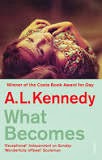Typically, I read the newly crowned Nobel Laureate, during November or December, if they aren't in my familiarity zone. I did not have to do that for a Saramago or a Llosa or Mo Yan as they weren't new to me when they were chosen for the award. But as for the current laureate, I haven't read any book of Alice Munro, barring a couple of stories published in New Yorker. For various reasons, the customary reading (of Nobel Winner) has split into the new year, and on a collective suggestion and a group reading choice, The View from the Castle Rock, was decided.
Being the first writer known only for writing 'short stories', to be a Nobel Laureate, it did attract a higher attention and expectation. The inside Cover specifically mentioned it as 'stories'. The book, however, is a progressive narrative of her own family, spanning over three centuries and two continents. As they say, one can always look at sources closed to us for inspiration, hence the vast number of 'autobiographical' or 'semi-autobiographical' writing in literature field . Alice Munro does exactly that, looking back at her family's history , from her great great grandfather to her step mother in a captivating, touching collection of stories. The book read like a novel to me, than a collection of short stories. A seamless narrative , chronologically progressed, albeit not in continuous sequences, leaving gaps in the story, space and time.
From the small Islands of Scotland, Alice starts her tales, of survival, of migration to greener pastures, intricacies of family connections and incidents and anecdotes. Set in two parts, part one, the family's journey from Ettrick Valley in Scotland to North America, and part two in the new lands and the later generations of her family. I personally liked the initial parts The back yard search for the clues and stories about the ancestors, few prolific ones, and the threading of these various anecdotes into a seamlessly woven story form was marvelous. I am not as enthused in the later part ( especially towards the end) , where the narration tends to be a bit disjointed. A bit of triviality takes over. The later part has a lot more personal experiences and more autobiographical in nature. The first part is more adventurous, the quest for hints and connecting dots, bringing few interesting characters of the Islands. The plan and the dream of the new land, the metaphorical "View from the Castle Rock" to the new world.
This is one of my first reading of Munro and I was talking about this being a progressive stories as in novel vis-a-vis a collection of short stories. I argued that a random reading of one of the stories in the middle, probably will have a lesser impact, as against reading these stories as a collective. I was told that she tends to play along these lines and the narration often breaches the boundaries of the novel and short story. Characters , places and events apparently pops up repeatedly in the other collections as well.
I would look at the two parts separately. Part one, largely based on the snippets of information she gathered during her visits and from various mentions in the old documents. She stich together a compelling story, enriched with beautiful imagery, characterisation ( build up from the data available) and fixing the missing links. This part which has more fictional element is fabulous, and a creation of a worthy hand. The second part, largely autobiographical and contemplative has lesser amount of fictional element, but more of internalisation of her own life and observations. The energy of her ancestors is derived into the later part, but these two remain different and in contrast in many aspects.
The terrain and the place has a large part of participation in her stories. These stories are all of limited scale and scope. Largely around relationships, confined within the family or short extensions in a few cases. There is a sense of intimacy, a closeness, a dependency of mutual existence. The gradual demo graphical and geographical changes in the landscape , minute observations of the changes in the living conditions et all are carefully handled through the stories. Beautiful passages, meditative, emotionally deep story telling and fabulous control over language makes this a great read.
-------------------------------------The View from Castle Rock ( 2006 )
Alice Munro
Vintage Books
349 Pages
--------------------------------------
Wiki, Guardian, NY Times, Quill & Quire

















